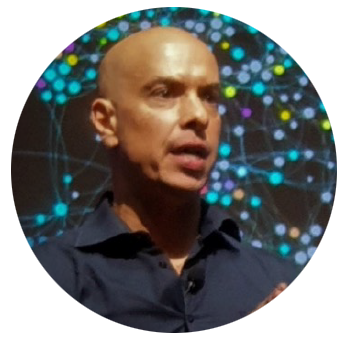Strategic Foresight: Leading in an uncertain and fast-changing world

COURSE OVERVIEW
Strategic Foresight is a set of principles, concepts and tools that help explore, imagine and anticipate the future in an open but strategic way. It can help identify and explore challenges and opportunities emerging from multiple signals and drivers of change shaping the future. It is also critical to inform decisions and act as a trigger for developing strategic options in a context full of unknowns.
Should you start thinking about bringing this in your organization? Absolutely. Should you double down on your organization’s futures literacy and foresight capabilities if you have already done work in this space? Certainly. This program is a concrete and powerful way to build future preparedness for individuals, organizations and more broadly for our society as a whole – and it is now more needed than ever.
The program will empower participants and their organization to better understand the past, improve decision-making in the present and embrace their preferred future in an accelerated and unpredictable world.
Facilitator

Founder and CEO IF Insight and Foresight
Paulo Soeiro de Carvalho has more than two decades of experience in Strategic Foresight and Innovation, working with both public and private institutions. His extensive work spans numerous consulting projects and a vast array of academic activities within these fields.
Drawing on his proficiency in Strategic Foresight, Innovation, and Entrepreneurship, Paulo founded “IF Insight & Foresight”, a consulting studio that blends those fields to create added value and distinctive experiences for organizations and professionals.
Paulo is an expert and consultant in Foresight & Innovation for several international institutions including the European Commission, Joint Research Center, and the European Environmental Agency. Additionally, he collaborates as an expert with the World Economic Forum in the areas Strategic Intelligence and Scenario Planning.
For the past 15 years, Paulo has undertaken various academic responsibilities at ISEG (Lisbon University). He has played a pivotal role in coordinating the Post-Graduation program titled “Foresight, Strategy and Innovation”, and has been the Director of the executive programs “Scenario Planning and Strategic Agility” and “Futures, Strategic Design and Innovation”. Since 2020, he has been the Executive Director of the ISEG MBA.
Paulo has a PhD in Management Sciences from Université Jean Moulin Lyon 3 (France), where he presented a thesis on Scenario Planning, Weak Signals, and Competitive Intelligence.
Pre-requisites:
None
Delivery Format:
Physical
Language:
English
Date:
29 – 31 January
Time:
9:00 AM – 4:30 PM
Registration Deadline:
January 4
Location:
Emirates Towers, 3D Office
Target Audience:
Decision Makers, Policy Makers, Project Managers, People within Innovation and Strategy
Fees:
AED 6,000Per Participant
COURSE OUTLINE
- Strategic Foresight: Origins, Principles and Schools of ThoughtText
- Strategic Foresight: Basic Concepts and Methodological Tools
- Strategy Foresight in Action (Case Studies)
- Foresight Applied to Public Administration / Government
- Corporate Foresight
- Technology Foresight & Assessment
- Strategic Intelligence / Horizon Scanning
- Futures Wheel
- Delphi Method
- Stakeholder Analysis
- Scenario Planning
- The skills and mindset of a Future-proof Leader
- Basic concepts of a future-proof strategy and innovation
- Design and develop a full project of Horizon Scanning, Scenario Planning and Strategic Innovation.
- •Working in groups, the participants will go through the entire process of Scanning and subsequent Scenario Planning and strategic analysis and action, exploring and experiencing the various steps of a project.
- The definition of the Strategic Focus and Time Horizon are critical decisions that will influence the Strategic Intelligence/Horizon Scanning stage of the process that will allow the building of a Scanning Dashboard integrating Megatrends, Trends, Weak Signals, and Wildcards.
- The project will be focused on the selection of Critical Uncertainties and the definition of the ”Structure” of the Scenarios, the basis for the description of stimulating and alternative futures.
- In the final stage of the Lab, participants will explore the implications and strategic options derived from the scenarios built using strategic and innovation radars and roadmaps.
Learning Objectives
Learning Objectives
- Empower participants and their organization to better understand the past, improve decision-making in the present and embrace their preferred future in an accelerated and unpredictable world.
- Learn how to make informed decisions about strategies and innovation processes that will help your organizations to make a difference and stay at the edge a fast-changing and uncertain environment.
- Improve the participants skillset and toolbox in strategic foresight and innovation including Scenario Planning, Horizon Scanning, Futures Wheels, Stakeholders Analysis, Delphi, Innovation Radars and Strategic Roadmaps.
- Learn how to integrate these tools and methods in strategic frameworks that have the potential to improve the competitive positioning of organizations and use those as inputs to identify new growth opportunities, foster strategic agility, and design innovation strategies and projects.
Learning outcomes
At the end of the program, the participant will be able to:
- Recognize key drivers of change and use them to be better prepared for future challenges and new opportunities.
- Build and explore scenarios for the future, combining them with tools of strategic design and agility.
- Use uncertainties and scenarios as powerful triggers to identify new growth opportunities, promote strategic agility and design innovation projects.
- Create future-proof strategies that perform well and are resilient to exponential change and disruption.
- Learn to use business model innovation strategies to adjust your competitive positioning.
- Identify areas of growth, and manage a portfolio of projects, products, services, or experiences.
- Design a strategic roadmap that will allow your organization to foster consistent innovation to sustain a competitive advantage.
- Build your organizational capability to address and act under uncertainty.
AGENDA
For any support and inquiries, please contact: [email protected]